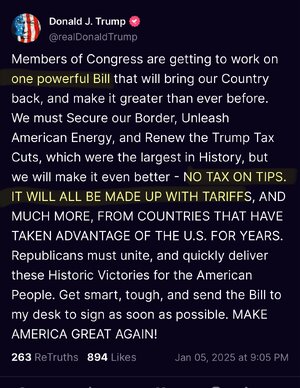Trump aides ready ‘universal’ tariff plans — with one key change
President-elect’s aides look at universal import duties, but only on certain sectors, among first big moves of presidency.
"... If implemented, the emerging plans would pare back the most sweeping elements of Trump’s campaign plans but still would be likely to upend global trade and carry major consequences for the U.S. economy and consumers.
As a candidate, Trump called for “universal” tariffs of as high as 10 or 20 percent on everything imported into the United States. Many economists warned that such plans could cause price shocks, and many Republicans in Congress might have criticized them.
Two weeks before Trump takes office, his aides are still discussing plans to impose import duties on goods from every country, the people said. But rather than apply tariffs to all imports, the current discussions center on imposing them only on certain sectors deemed critical to national or economic security — a shift that would jettison a key aspect of Trump’s campaign pledge, at least for now, said the people, who cautioned that no decisions have been finalized and that planning remains in flux. The people spoke on the condition of anonymity to describe private conversations.
...The potential change reflects a recognition that Trump’s initial plans — which would have been immediately noticeable in the price of food imports and cheap consumer electronics — could prove politically unpopular and disruptive.
But consideration of universal tariffs of some kind still reflects the Trump team’s determination to implement measures that can’t be easily circumvented by having products shipped via a third country.
Exactly which imports or industries would face tariffs was not immediately clear. Preliminary discussions have largely focused on several key sectors that the Trump team wants to bring back to the United States, the people said. Those include the defense industrial supply chain (through tariffs on steel, iron, aluminum and copper); critical medical supplies (syringes, needles, vials and pharmaceutical materials); and energy production (batteries, rare earth minerals and even solar panels), two of the people said.
It’s also unclear how these plans intersect with Trump’s
stated intent to impose 25 percent tariffs on Mexico and Canada and an additional 10 percent tariff on China unless they take measures to reduce migration and drug trafficking.
Many business leaders view those measures as unlikely to ever take effect, but some people familiar with the matter said they could be imposed along with universal tariffs on key sectors. ..."
----
Farm/food sector seems noticeably absent from this universal tariff plan ...

